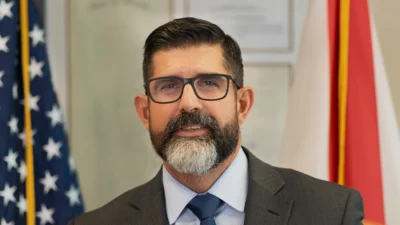University of Florida Health issued the following announcement on Nov. 15.
When Dominique Calloway moved to the small, rural town of Archer, Florida, 11 years ago with her four children, she set out on a search to find the family a primary care provider. Expecting no closer option than Gainesville, Calloway heard from a friend about a great clinic right in her community.
She decided to check it out. And the Calloways have been patients at UF Health Archer Family Health Care, or AFHC, the University of Florida College of Nursing’s nurse-led primary care practice, ever since.
Calloway said she feels that she and her family are more than just patients. After going to AFHC for about one year, a staff member approached her near the holidays and asked what her plans were. Calloway mentioned her worries about being able to afford gifts for the children.
“All of a sudden, they came to my house bearing gifts for me and the kids,” she said. “That Christmas, they made it so special because I did not know what I was going to do to fulfill the kids’ wishes for Christmas. It just so happens that they were my little personal angels. I love them for that.”
For 20 years, the AFHC team has believed providing health care is just the starting point of the practice’s involvement in the community. Adopting families for Christmas, sponsoring youth sports teams, participating in events and hosting health fairs are among the ways the practice has helped shape the community. College of Nursing students also receive one-of-a-kind education through clinical and volunteer experiences.
“Our team is an integral part of health care in this community,” said Denise Schentrup, associate dean for clinical affairs and the practice director. “We have been taking care of the community for many years, and it really shows in the way our staff and providers care for our patients. They remember the patients, they remember details about their family, and they really make them feel like they are at home when they come here.”
AFHC patients are primarily lower-income and uninsured, and are charged using a sliding-fee scale. More than 40% of the practice’s patients lack health insurance, but AFHC providers and staff are committed to a patient-centered approach to care and building better relationships between the patient and the care team.
“They want the best for you,” Calloway said. “They want you to be in the best health possible. They want to make sure you are OK, make sure you’re comfortable, make sure you’re treated as family. The whole staff, everyone is so close. They have a way of lifting you up and making you feel better. And they have a way of making you smile.”
The nurse-led primary care setting is unique, but it is also crucial right now as the country works to meet the demands of a chronically ill, older population, said Anna M. McDaniel, the College of Nursing’s dean and the Linda Harman Aiken Professor.
“Nurses meeting the health care needs in the U.S. is the underlying theme of the National Academy of Medicine’s recent report to Congress on the future of nursing and how to achieve health equity in our country,” McDaniel said. “It’s very important to have the nursing perspective on how to keep people healthy.”
Since its establishment, AFHC has relied on the philanthropic support of individuals and foundations, and grants from federal, state, local and private organizations.
Numerous grants from the Health Resources and Services Administration, or HRSA, an agency of the U.S. Department of Health and Human Services, have sustained the practice through the years. In addition, the Health Care For All fund was established at the college in 2001 by donors and continues to receive funding.
McDaniel said financial stability of the practice is essential to continue to meet the greatest needs of our very deserving patients. AFHC is unique in its longevity and commitment to making sure patients feel comfortable at the practice, no matter their resources.
“Everybody at the College of Nursing — not just me — is very proud of Archer Family Health Care,” McDaniel said. “It is a place where we serve the underserved, and that’s an important value of the nursing profession. It’s a place where our students have a different kind of clinical exposure than they get in an in-patient setting. Our faculty have opportunities to maintain their skills and clinical practice. It’s everything an academic nurse-managed clinic is supposed to be.”
Original source can be found here.


 Alerts Sign-up
Alerts Sign-up